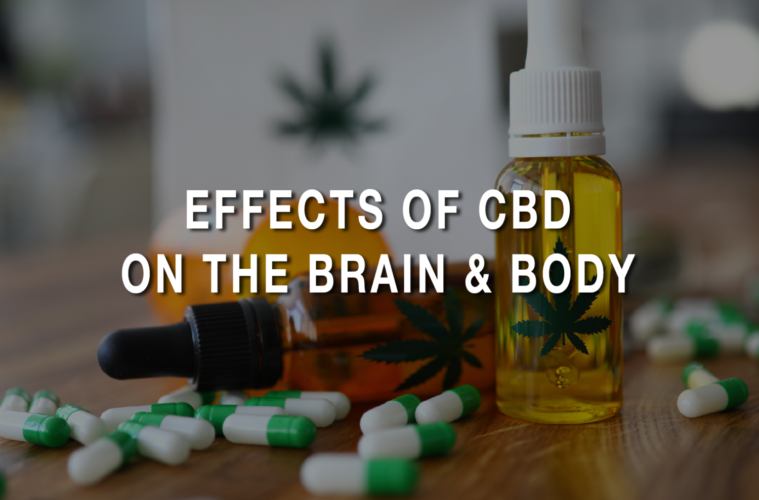This article was originally published on SafeForMeCBD.com. To view the original article, click here.
CBD is a cannabinoid that is derived from the cannabis plants that are gaining popularity for its therapeutic properties. CBD products have quite a name in the health and wellness industry. In this article, we will explore the effects of CBD on our brain and body.
Brief Note On CBD And Its Uses
CBD contributes to the long list of compounds contained in cannabis plants. The cannabinoid is present in all types of cannabis plants that include marijuana and hemp, although their concentrations vary from plant to plant. Marijuana is known for its significantly large THC content while hemp plants have CBD as its major cannabinoid.
CBD has wide-ranging applications in the therapeutic and wellness industry. Here are some of its applications.
- Inflammation relief: Inflammation symptoms are often associated with several medical conditions, and in some cases, pain symptoms of varying degrees are rooted in inflammation. CBD is an anti-inflammatory that effectively brings down the inflammation levels by exerting better control over the inflammatory responses in our biological system.
- Pain relief: Pain relief is still the most celebrated benefit of cannabis. CBD has excellent analgesic properties, which means the compound can be used to reduce the severity of pain symptoms. Conventional pain killers also succeed in helping you cope with pain but many have various associated side effects, which may include sedative effects.
- Skincare: When it comes to skincare, CBD offers a wide range of benefits. In addition to proving to be effective in treating the symptoms of skin disorders like psoriasis and eczema; CBD proves to be a suitable addition to your daily skincare routine owing to its hydrating and antioxidant properties.
- Anxiety relief: Several studies have confirmed that CBD is potent enough to handle the anxiety symptoms of various disorders like generalized anxiety disorder and social anxiety disorder.
- Epilepsy: Epilepsy is often associated with severe seizures, the most notable symptom of the condition. CBD can reduce the severity and frequency of the aforementioned seizures. The only FDA approved CBD drug is Epidolex that is used to treat Dravet syndrome and Lennox-Gastaut syndrome, two rare forms of epilepsy in children.
- Improved sleep: By regulating your sleep-wake cycle adequately, CBD offers you quality sleep, all the while helping you stay active during the day.
Influence Of CBD On Brain Activity
As you all know, human brain is constituted by a number of highly specialized nerve cells – neurons. These neurons connect with one another by sending chemical messengers called neurotransmitters through the gaps (between two neurons) called synapses.
The sensitivity of a neuron to a neurotransmitter is dependent on whether or not it has a receptor that is the exact match to the neurotransmitter. The neuron will directly respond to its respective receptor in case there is a match. Else it won’t. All neurons have multiple receptors and they respond to the neurotransmitters corresponding to those receptors alone.
Dopamine and serotonin are some neurotransmitters that are produced within the brain. The brain responds to chemical messengers that are produced outside the body also. The chemical messengers include CBD and THC, the plant cannabinoids. Except when taken in topical form, CBD enters your brain by traveling through your bloodstream. On reaching the brain, the compounds interact with some but not all the neurons present.
Effect Of CBD On Receptor Systems?
CBD is never seen to directly interact with CB1 or CB2 – the two cannabinoid receptors. Instead, it exerts an indirect influence on the response of these receptors. CBD is known to have the ability to increase the levels of cannabinoids that are produced within the body (endocannabinoids) through an inhibitory action on the enzymes that break them down.
Additionally, CBD is also seen to influence several non-cannabinoid receptor systems; for instance the opioid receptors. Pharmaceutical pain killers, as well as commonly abused drugs like heroin and morphine primarily target the opioid receptors. CBD also interacts with the dopamine receptors that are crucial in regulating various cognitive and behavioral aspects including motivation and reward-seeking behavior.
Although it lacks sufficient scientific research and proof, the effects suggest the possibility of using CBD to control drug cravings. The interaction of CBD with the serotonin system is also relevant when it comes to handling addiction. Animal studies have revealed that CBD activates multiple serotonin receptors in the brain. These interactions are crucial in its ability to reduce drug cravings. The interaction with the serotonin system is also relevant in the context of the anti-anxiety properties of CBD.
CBD And The Serotonin System
The ability of CBD to interact with a serotonin receptor – serotonin 1A is associated with a wide range of its therapeutic benefits. The interaction suggests that CBD can be used to handle neuropathic pain, opioid addiction, anxiety, depression, nausea, and vomiting, as well as the negative symptoms of schizophrenia.
All therapeutic benefits offered by CBD are based on its interaction with the endocannabinoid system that handles various bodily functions.
Advertising disclosure: We may receive compensation for some of the links in our stories. Thank you for supporting LA Weekly and our advertisers.


